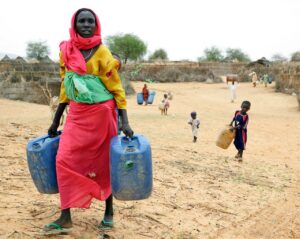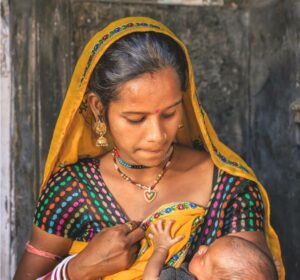Who Cares in the Climate Crisis? Gender, Rights, and Resilience
07.11.25
As the world prepares for the next UN Climate Change Conference (COP), Make Mothers Matter (MMM) highlights a crucial yet overlooked truth: care is essential infrastructure. When floods destroy homes or heatwaves strain health systems, it is women, especially mothers, who hold families and communities together. Their unpaid and often invisible care work keeps societies functioning in times of crisis, yet it remains largely unsupported and undervalued in climate policy and financing.

In her recent blog article, “Who Cares in the Climate Crisis? Gender, Rights, and Resilience,” Gizem Demir Nirennold, MMM Representative at the United Nations in Geneva, examines how climate change magnifies care burdens and deepens gender inequality. Drawing on international frameworks such as CEDAW General Recommendation No. 37 and the UNFCCC Gender Action Plan, she argues that without explicitly recognising and redistributing care responsibilities, climate action risks reinforcing existing injustices rather than remedying them.

The article analyses two key case studies, the 2022 monsoon floods in Pakistan and gender-responsive cyclone shelters in Bangladesh, to show both the challenges and solutions. In Pakistan, floods transformed everyday care into emergency survival, as disrupted health services and displacement intensified women’s unpaid work and jeopardised their health and safety. Bangladesh, by contrast, demonstrates how gender-sensitive planning and women’s leadership can reduce risks and strengthen community resilience when care is centred in adaptation design.
The lesson is clear: to build resilient societies, care must be treated as core climate infrastructure, as vital as energy, transport, or water systems. Investing in care means investing in resilience, equality, and human rights.
Echoing the article, Gizem’s video message for the International Day of Care and Support delivers MMM’s key call to action:
“Investing in care means protecting rights, strengthening resilience, and building a more equal and sustainable future for all.”
As COP approaches, MMM urges policymakers to embed care into national climate strategies and adaptation plans. Recognising, valuing, and financing care systems, from childcare and health to water and social protection, is not only a matter of gender justice; it is a cornerstone of climate resilience and sustainable development.
Our message for the International day of Care & Support (29 October)
The New EU Gender Equality Roadmap : A Call for Inclusion of Mothers
04.03.25
The European Commission’s initiative on a new Gender Equality Roadmap post-2025, marks a significant step forward in addressing gender disparities across the European Union. Make Mothers Matter (MMM
Breaking the Cycle: Gender Equality as a Path to Better Mental Health
18.03.25
The Council of the European Union has taken a decisive step in recognising the vital connection between gender equality and mental health.
Europe Must Listen to Mothers: Our landmark report heads to the European Parliament
28.08.25
On 22 September 2025, the voices of mothers will take centre stage in Brussels. For the first time, Make Mothers Matter (MMM) will present its State of Motherhood in Europe








